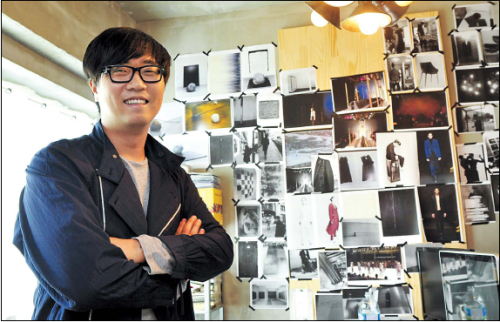More artist than designer, Sheen targets customers who understand his philosophy
This is the third in a series of articles on up-and-coming Korean designers. ― Ed.
The studio-office in Sinsa-dong, southern Seoul, which Sheen Jehee designed himself, was just like his collections ― calm, with careful twists like the geometric lighting. The only unexpected thing was a shelf full of foreign-language text books ranging from English, French and Italian to Japanese and Chinese.
“Many fashionable people are Italians. When I can speak their language, I can touch their hearts more easily. Recently, I’ve also been learning French,” Sheen, the creative director of his brand JEHEE SHEEN, told The Korea Herald.
While most young designers struggle to launch their brands overseas, Sheen’s case is unique ― he was first discovered in Italy. After graduating Marangoni Institute at the top of the class he worked at Giorgio Armani for a few years and then participated in the Pitti Uomo, Italy’s biannual men’s trade show, in 2009 for the first time as a Korean designer with his own label.
 |
Designer Sheen Jehee at his office in Sinsa-dong, southern Seoul. (Kim Myung-sub/The Korea Herald) |
He is now working in Seoul, taking time to build his base in the domestic market and to prepare his spring back to the international scene. His clothes are currently found in select shops in major cities like Seoul, L.A., Berlin and London.
Foreign buyers show a big interest, he said. He has been introducing his collections at Paris Tranoi since 2009 and at Seoul Fashion Week since 2010; and will also show in New York and Berlin later this year. His ultimate goal is to take the runway in Paris.
“I am getting lots of business offers. Some suggest starting a second label. But I asked them to wait a year,” said Sheen. It has been only two years since his brand’s launch, he said, and the priority now is to establish a signature image of his brand, like for instance, ‘the brand has nice black coats.’”
So far the “image branding” work seems to be going well, because at the mention of the brand JEHEE SHEEN, what comes to mind is something zen-like, monk-like, and Asian. That was roughly what he was going for.
“I try to incorporate Confucian, humanist and Asian ideas into my designs. They do not simply show the wearer’s social status or aesthetic consciousness but also attitude toward life and philosophies. I am very interested in fashion therapy,” he said, defining himself as a “designer who shows contemporary human characters and opens the genre of neo-humanism.”
Pointing to photos of artist Lee U-fan’s installations posted on a wall, he said the interest in natural beauty and the philosophical attitude toward life may be the core of Korean culture which could be interpreted as a certain aesthetic consciousness.
“The procedures of getting dressed in the morning and undressing at night or old Korean ladies putting their hair into a bun are great performances containing Confucian ideas. I want to show the invisible elements of designs that contain such ritual-like procedures, for example, having to tie your pants several times in layers,” said the designer.
Sheen was interested in Asian philosophy since he was a kid. He and his friends used to give books by Chinese philosophers like Laozi, Zhuangzi and Confucious to each other as birthday presents.
“I was thinking about going to law school but changed to fashion design. I realized that being a designer meant that I could ponder on aesthetics and create something new until I die.”
His new collection, which he showcased in Tranoi last month, is themed “Life is suffering.”
“Ascetics always wear comfortable clothes. Regarding life itself as a suffering, what we should wear should be convenient and classic as well. I wanted to give freedom to contemporary men by fashion,” said Sheen. He used natural fabrics dyed by Korean artisans, which he said are of good quality, not any less than imported ones.
With such philosophy-inspired clothes, would it not be difficult to reach marketability?
“I’m doing it because I love it, but also as a marketing strategy. If the customers are attracted to our clothes and understand the depth, it will lead to loyalty. What we need to do is to assure them that we will maintain the brand’s identity,” said Sheen.
The brand targets professional workers in their 30s to 80s. Sheen said that older men are important customers as well because they no longer dress differently than the young, unlike several decades ago. Foreigners find the clothes comfortable, especially, because of their ample measurements.
“I am thinking about video art, because it is hard to explain the essence of my clothes only with shows or look books. I am also very interested in expressing them through installation art. Maybe I will get to publish a photo book showing the works, in about five years time,” he said.
By Park Min-young (
claire@heraldcorp.com)








